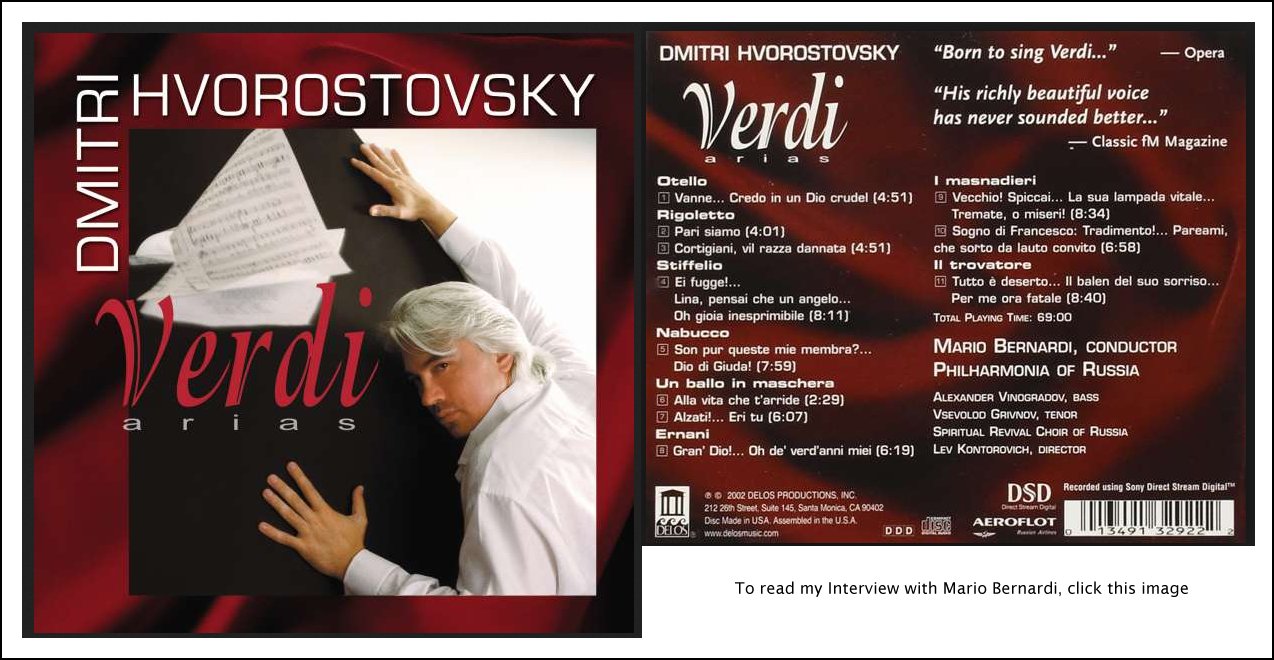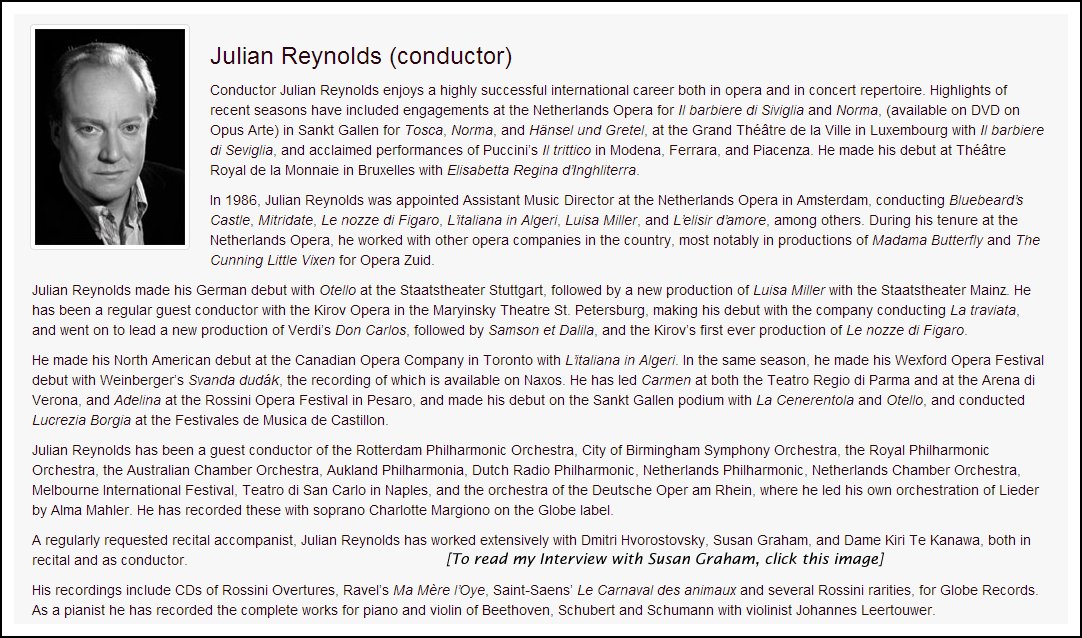Dmitri Hvorostovsky Interview with Bruce Duffie . . . . . . . (original) (raw)
Baritone Dmitri Hvorostovsky
An Early Conversation with Bruce Duffie
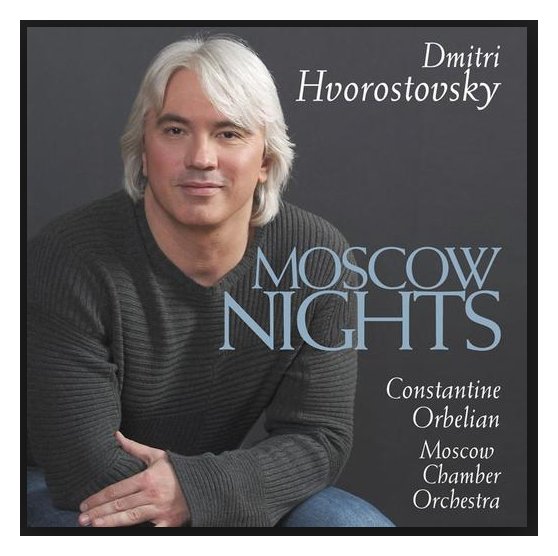
Dmitri Aleksandrovich Hvorostovsky (Дми́трий Алекса́ндрович Хворосто́вский), born 16 October 1962, is a Russian operatic baritone.
Hvorostovsky was born an only child in Krasnoyarsk in Siberia. He studied at the Krasnoyarsk School of Arts under Yekaterina Yofel and made his debut at Krasnoyarsk Opera House, in the role of Marullo in Rigoletto. He went on to win First Prize at both the Russian Glinka Competition in 1987 and the Toulouse Singing Competition in 1988.
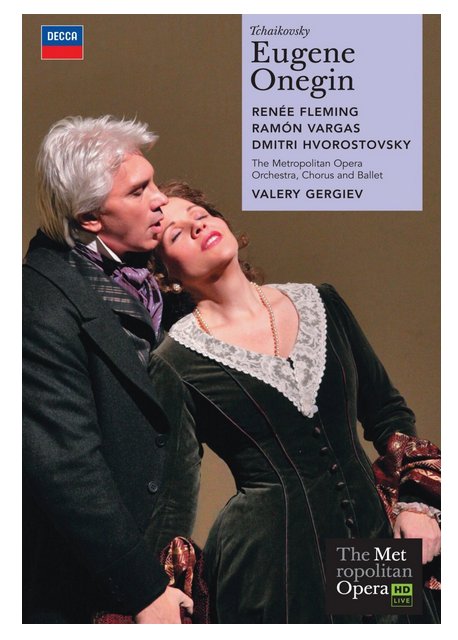 Hvorostovsky came to international prominence in 1989 when he won the BBC Cardiff Singer of the World competition, beating local favorite Bryn Terfel in the final round. His performance included Handel's "Ombra mai fu" and "Per me giunto...O Carlo ascolta" from Verdi's Don Carlos. His international concert recitals began immediately (London debut, 1989; New York 1990).
Hvorostovsky came to international prominence in 1989 when he won the BBC Cardiff Singer of the World competition, beating local favorite Bryn Terfel in the final round. His performance included Handel's "Ombra mai fu" and "Per me giunto...O Carlo ascolta" from Verdi's Don Carlos. His international concert recitals began immediately (London debut, 1989; New York 1990).
His operatic debut in the West was at the Nice Opera in Tchaikovsky's The Queen of Spades (1989). In Italy he debuted at La Fenice as Eugene Onegin, a success that sealed his reputation, and made his American operatic debut with the Lyric Opera of Chicago (1993) in La traviata.
He has since sung at virtually every major opera house, including the Metropolitan Opera (debut 1995), the Royal Opera House at Covent Garden, the Berlin State Opera, La Scala and the Vienna State Opera. He is especially renowned for his portrayal of the title character in Tchaikovsky's Eugene Onegin; The New York Times described him as "born to play the role."
In 2002, Hvorostovsky performed at the Russian Children's Welfare Society's major fund raiser, the "Petrushka Ball". He is an Honorary Director of the charity. A tall man with a striking head of prematurely silver hair, Hvorostovsky has achieved international acclaim as an opera performer as well as a concert artist. He was cast in People magazine's 50 most beautiful people, a rare occurrence for a classical musician. His high, medium-weight voice has the typical liquid timbre of Russian baritones.
A recital program of new arrangements of songs from the World War II era,Where Are You My Brothers?, was given in the spring of 2003 in front of an audience of 6,000 at the Kremlin Palace in Moscow, and seen on Russian Television by over 90 million viewers. The same program was performed with the St. Petersburg Symphony Orchestra for survivors of the Siege of Leningrad on 16 January 2004.
In recent years Hvorostovsky's stage repertoire has almost entirely consisted of Verdi operas such as Un Ballo in Maschera,La Traviata and Simon Boccanegra. In 2009 he appeared in Il Trovatore in a David McVicar production at the Metropolitan Opera with Sondra Radvanovsky.
In June 2015 Hvorostovsky announced that he had been diagnosed with a brain tumor and canceled all his performances through August. Family representatives say that he will be treated at London's cancer hospital Royal Marsden. In spite of his illness Hvorostovky returned to the stage at the Metropolitan Opera in September as Count di Luna in Il Trovatore for a run of three performances opposite Anna Netrebko. He received strong reviews from both critics and audiences for his performance.
In doing interviews for twenty-five years, I have met with musicians at various stages of their careers. Some were older and shared their life
’s experience; some were midway, and Janus-like looked both forward and back; and a few were at the outset of what turned into either long service or a brief flash. Dmitri Hvorostovsky, whose conversation is presented on this webpage, became a legendary artist, and had a brilliant reputation onstage, in recital and concert, and on recordings. Today (mid-2017) it is only his devastating health issue that keeps him from continuing along this magnificent path.
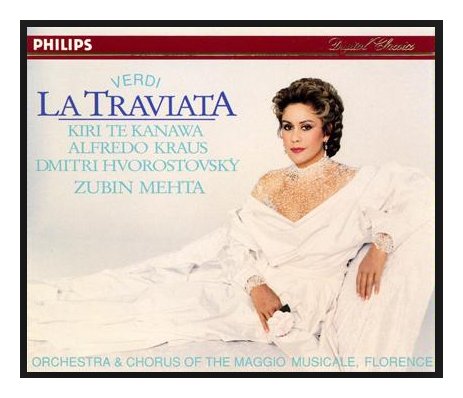 We met backstage at Lyric Opera of Chicago in September of 1993, when he was making his American operatic debut as Germont in Traviata with June Anderson and Giuseppe Sabbatini, conducted by Bruno Bartoletti. He would return to Lyric two years later for Valentin in Faust with Richard Leech, Renée Fleming, and Samuel Ramey, led by John Nelson and directed by Frank Corsaro, as well as another Traviata in 1998-99 with Andrea Rost and Frank Lopardo, Balloin 2002-03 with Veronica Villaroel, Neil Shicoff, Maria Kanyova, and Larissa Diadkova, conducted by Mark Elder, and finally, in 2007-08 Onegin with Dina Kuznetsova, Frank Lopardo, and Vitalij Kowaljow, led by Sir Andrew Davis. Hvorostovsky and Fleming would give a Subscriber Appreciation Concert in June of 2012, and he also sang a solo recital in February of 2016. [Names which are links on this webpage refer to my Interviews elsewhere on my website. Vis-à-vis the recording shown at right, see my Interviews with Kiri Te Kanawa, Alfredo Kraus, and Zubin Mehta.]
We met backstage at Lyric Opera of Chicago in September of 1993, when he was making his American operatic debut as Germont in Traviata with June Anderson and Giuseppe Sabbatini, conducted by Bruno Bartoletti. He would return to Lyric two years later for Valentin in Faust with Richard Leech, Renée Fleming, and Samuel Ramey, led by John Nelson and directed by Frank Corsaro, as well as another Traviata in 1998-99 with Andrea Rost and Frank Lopardo, Balloin 2002-03 with Veronica Villaroel, Neil Shicoff, Maria Kanyova, and Larissa Diadkova, conducted by Mark Elder, and finally, in 2007-08 Onegin with Dina Kuznetsova, Frank Lopardo, and Vitalij Kowaljow, led by Sir Andrew Davis. Hvorostovsky and Fleming would give a Subscriber Appreciation Concert in June of 2012, and he also sang a solo recital in February of 2016. [Names which are links on this webpage refer to my Interviews elsewhere on my website. Vis-à-vis the recording shown at right, see my Interviews with Kiri Te Kanawa, Alfredo Kraus, and Zubin Mehta.]
His English was quite good, though, as always with non-native speakers, it was filled with hesitations, mistakes in tense, oddities of structure, as well as the occasional made-up word. Much of that has been straightened out here, though a few of his delightful turns have been left in the text. Needless to say, though, I have not changed any of his ideas nor altered anything more than simple corrections he himself would have made if he had been given the chance.
Even at this very early stage of his career, he understood his voice, as well as the necessary trajectory to stay at the top of his profession for many years.
Bruce Duffie: Do you find operatic life in Western Europe and America more exciting and more challenging than in Russia?
Dmitri Hvorostovky: I’m not based in Russia anymore. The very few times I’m coming back, usually I’m giving concerts or recitals. Because I’m not working in the opera house, and I’m not based anywhere, I can be just a guest singer. Of course, instead of a regular relationship with Mariinsky Theatre in St. Petersburg, I can do some things there. Actually I’m doing some things there, but not very much. I can remember my expression the first time I was brought here to the U.S. I was very excited, but after a while you take it just naturally because you’re working.
BD: You’re asked to sing all kinds of roles. How do you decide which roles you will learn, and which roles you’ll postpone for awhile?
DH: [Laughs] It wouldn’t surprise you if I tell you that four years ago, right after my wining competition in Cardiff, I’d been invited to sing parts like Simon Boccanegra, or Rigoletto, and Posa, and Renato, etc. Of course I realized that I couldn’t do them so soon because I was rather too young for those parts. So I had to choose very carefully which way I would go. This is why I was taking more recitals in the beginning, and actually it helped me in my career. Afterwards, kind of step by step, slowly, I began making my operas, but still I can’t sing so many operas like I’ve just mentioned above. Probably in five years I can put much more pressure and much more attention on the Verdi operas. Now I’m doing Donizetti and Rossini, and a few, though not very many Russian works, unfortunately, because the main baritone parts are written for bass-baritones in Russian music
— like Gryaznoy in Tsar’s Bride (photo of recording shown below), or Prince Igor, or even Boris Godunov. It’s very good for the baritone, but they’ve been taken over by the basses.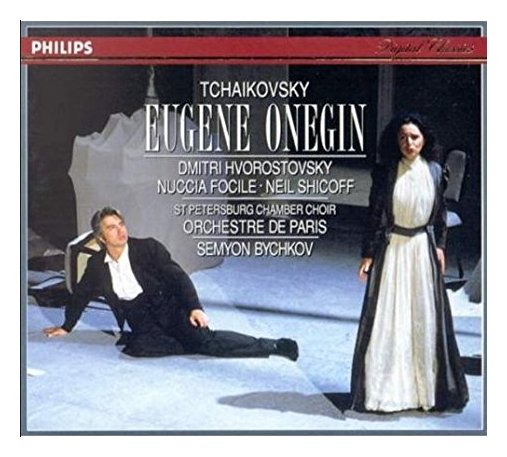 BD: They’re jealous and they want those roles.
BD: They’re jealous and they want those roles.
DH: Well, yes, and unfortunately I can just sing Onegin and a very few Tchaikovsky roles, and that’s all.
BD: Is Onegin a satisfying role to sing?
DH: Absolutely! It’s very interesting to sing and to act. It’s great music, still.
BD: Is he nuts? [Vis-à-vis the recording shown at right, see my interview with Semyon Bychkov.]
DH: [Laughs] Well, sort of, yes. What is interesting is you can play this role in many different ways. It can be even nice. He can be loved by the audience because they would feel sorry for Onegin. Don’t forget that in the last act Onegin becomes completely different person. When he wants to win the love of Tatyana, it changes him a lot, and it changes the subject in this dramatic line in the opera.
BD: Could they have been happy if he had realized his love earlier in the opera?
DH: [Thinks a moment] I don’t believe he would realize it. If he would realize that he is in love sooner, we wouldn’t have this subject and this story! [Both laugh] There has to be some intrigue. I would describe the story in a very usual way. I would say it can happen naturally in any age, in any time, even now. It will show weight, a kind of nobility of the behavior of the age, the personage which has been described at the beginning of the nineteenth century. People will forget themselves for a while, and immerse themselves in the rest of the subject. You will see it can be happen, anyhow.
BD: Does the opera adhere closely to the Pushkin, or does Tchaikovsky take liberties?
DH: It’s quite close to Pushkin, but Tchaikovsky kind of simplified it, made the subject much more simple because of the music. It’s too much to put it all into an opera. It’s such a high level of poem, actually. It’s one of the most well-known poems of Pushkin, and has such a nobility of the language. It’s very high language, full of sarcasm, full of real humor, and full of really high poetic lines. It’s far too much to even imagine this put into an opera because opera expects some kind of simplicity.
BD: And more realism?
DH: More realism, and a more simple presentation I would say.
BD: Does it please you to know that because of this opera, the Pushkin poem is somewhat more known in the West?
DH: I am sure lots of people do know Pushkin’s poems. Because Tchaikovsky had the same genius, this is the connection of two geniuses, so it makes twice as big an effect for ordinary people who probably don’t know about Pushkin or Russian poetry.
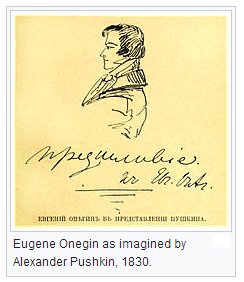 Eugene Onegin (Евге́ний Оне́гин, Yevgeniy Onegin) is a novel in verse written by Alexander Pushkin.
Eugene Onegin (Евге́ний Оне́гин, Yevgeniy Onegin) is a novel in verse written by Alexander Pushkin.
Onegin is considered a classic of Russian literature, and its eponymous protagonist has served as the model for a number of Russian literary heroes (so-called superfluous men). It was published in serial form between 1825 and 1832. The first complete edition was published in 1833, and the currently accepted version is based on the 1837 publication.
Almost the entire work is made up of 389 stanzas of iambic tetrameter with the unusual rhyme scheme "AbAbCCddEffEgg", where the uppercase letters represent feminine rhymes while the lowercase letters represent masculine rhymes. This form has come to be known as the "Onegin stanza" or the "Pushkin sonnet."
The innovative rhyme scheme, the natural tone and diction, and the economical transparency of presentation all demonstrate the virtuosity which has been instrumental in proclaiming Pushkin as the undisputed master of Russian poetry.
Sometimes it does work for people who are not aware or who do not understand something. I would say it’s like a compromise which is used to be done by someone like Pavarotti. In the last few years he contributed a huge part to make people, who just simply ignored classical music, understand it. Of course it has been ‘cooked’ in a way to be more simple, but it’s still classical music, and it’s very high-level of performance. Because I’m a musician, we have to do something to get to these people, to make them pay more attention to classical music, which is very important.
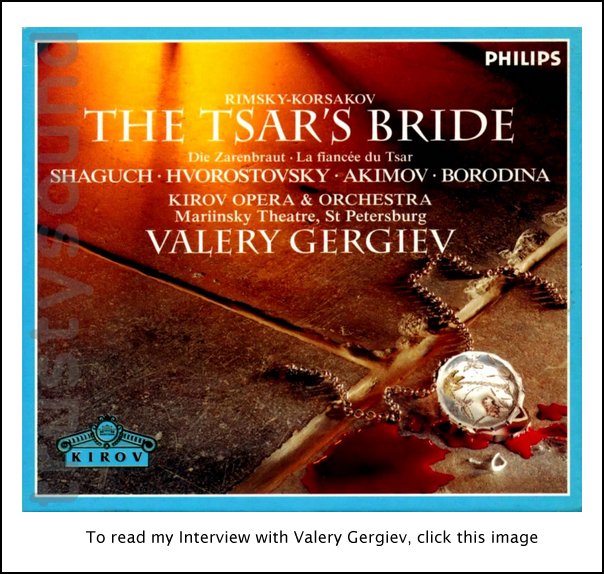 BD: Do you feel that recordings help this?
BD: Do you feel that recordings help this?
DH: Everything and anything
— recordings, television shows, radio, anything — but it always has to be kind of broader then you get usually. I wouldn’t step over on this level, because it could immediately be bad taste. It’s very dangerous.
BD: Do you feel that opera and concert music for everyone?
DH: It can be for everyone. I’m quite sure because opera is such a synthesized genre. It includes everything. Lighting now is a huge thing, as well as art work, acting, musical ideas, orchestra, everything. And it has to be interesting. Unfortunately, opera is the most conservative genre, but the stories and this wonderful music will never die because most of them we love very much, especially when it’s written by geniuses.
BD: Do you only perform the operas by geniuses?
DH: Well, I’m trying to! [Has a huge laugh]
BD: [Gently protesting] Is there not a place for some of the lesser composers?
DH: It has some place as soon as you realize it’s worth it to do. You can be disturbed by this music too often because most is contemporary, and is written with completely new ideas and new profiles. They can always make you a very interested in that.
BD: Do you have any advice for a composer who would like to write an opera around you?
DH: [Laughs] You better ask someone else. I’m far too young to give advice for composers. But from my point of view, if I’m hearing, and listening, and seeing something interesting, I immediately react. I wouldn’t give you examples, but I do love contemporary music. When I was much younger, I used to do it a lot when I was a member of Krasnoyarsk Theater, when I lived in Krasnoyarsk, my home town. I was doing a lot of contemporary music written by our young composers. It was almost all twelve-tone music, which was
very difficult. Also it was a very nice part of my education to get through the quite complicated melody line. It was okay for me.
BD: So then you might come back to some contemporary music?
DH: Yes, why not? I have so many things to do, and I haven’t done even three per cent of what I could do. I have to put so much work into the classical stuff, and then when I get over forty I’ll do something more and new and contemporary. [Laughs] I don’t know. You can get bored with classical music because don’t forget, all musicians are quite crazy. [Both laugh] Actually I simply can’t do six times for two weeks singing Traviata. It’s quite difficult for me. I have to refresh my mind all the time, otherwise I will be terribly bored from this music. Maybe when I will get a really tired of singing classical stuff
— which is very doubtful— maybe I’ll do something different.
BD: [With a gentle nudge] You won’t be a rock singer, will you???
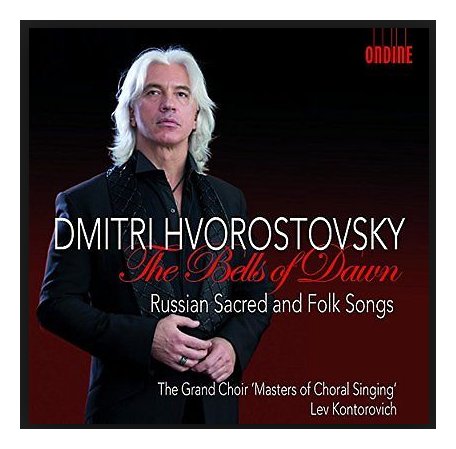 DH: I used to be a rock singer when I was a teenager. I was doing a lot of rock music and pop music. I feel very pleased now, and I’m very grateful to my friends who brought me to this stage, because I received my first stage experience when I was so young, and actually it was very helpful for me.
DH: I used to be a rock singer when I was a teenager. I was doing a lot of rock music and pop music. I feel very pleased now, and I’m very grateful to my friends who brought me to this stage, because I received my first stage experience when I was so young, and actually it was very helpful for me.
BD: Is there a huge difference singing rock music and concert music?
DH: I would say yes and not because yes, it’s a different way and style of singing, even a different way of performing. You probably would be surprised if I would say you’re going to use different muscles in your throat when you sing pop music. This is not because you have to be very concentrated and honest. The major reason is you wouldn’t be loved, you wouldn’t be understood. You would be booed immediately if you make some kind of shit!
BD: You’ve made a number of recordings. Do you sing differently in the recording studio than you do in the concert hall or the opera house?
DH: It’s a very good question. You can ask a hundred people and they would all answer you differently because it’s quite difficult to imagine yourself just alone in front of a microphone. You have to be clear, like what you have brought to the live performance. You have to imagine that the audience exists in front of you – not only the mike but the audience. In that case you will receive some nice results. If you can’t imagine it, you have to find other clues, because it’s very important. Most of new recordings are very clean, and they’re very, very similar to each other. They are very much the same because you use the same machines, the same type of very clever mikes, but something very fresh and delicate is gone because you don’t have this kind of atmosphere. It is a different atmosphere, a different spirit that you have in a concert or in a live performance which is recorded. Most of the Toscanini records were live, and we will enjoy them for many centuries because they really have some purity. Also Furtwängler, etc., and most of genius conductors in the middle of this century are still worthy of adoration.
[At this point we are interrupted by a phone call, in which he speaks Russian, and then we return to our conversation...]
BD: Now you’re back to thinking in English?
DH: Yes. I’m dreaming in English!
BD: [Surprised] Are you really??? Good... well, I say ‘good’, but is that good or not?
DH: I don’t know. I’ve spent already many hours talking Russian, and it’s quite difficult.
BD: When you go to a new city in America, do you try to make contacts with the Russian community there?
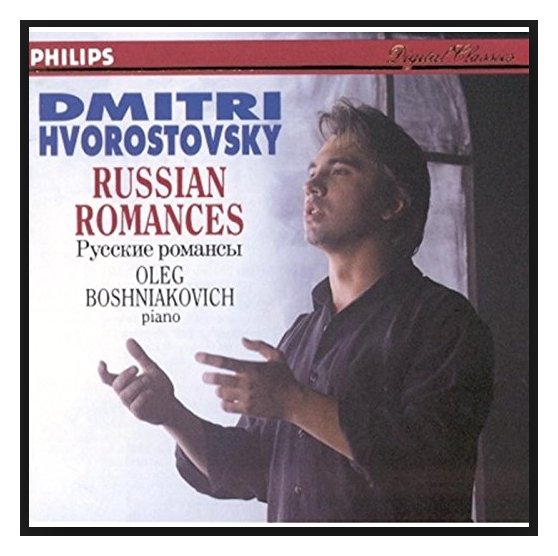 DH: I never do that, no. Maybe it’s strange, but somehow I am a little bit of afraid to be disappointed, because most of the Russians here in America are different. Honestly I have a lot of Russian friends here, but the first contact is difficult. It is just probably my mental problem because I’m not very connected with them in my mind. The first contact is always very scary for me... not really scary, but somehow I’m too shy.
DH: I never do that, no. Maybe it’s strange, but somehow I am a little bit of afraid to be disappointed, because most of the Russians here in America are different. Honestly I have a lot of Russian friends here, but the first contact is difficult. It is just probably my mental problem because I’m not very connected with them in my mind. The first contact is always very scary for me... not really scary, but somehow I’m too shy.
BD: But you’re involved in the opera house, so that’s your main contact here?
DH: Yes.
BD: We were talking a bit about recordings. Would you prefer to have some of your performances issued on disc?
DH: Of course I would. I keep talking about it, and I keep asking my colleagues to do some live recordings, and I’m sure it’s going to be sooner or later that I will record some of my stuff. I also know lots of interesting musicians, including conductors who keep telling the same things. Probably we have to wait just a little bit more until the recording equipment and the machinery will get to another generation to make it as clean and brilliant as possible.
BD: Would you wear a little mike in your costume?
DH: Why not? My generation has been accustomed to the use of mikes even in fancy programs. I haven’t sung pop music, but I had to sing some folk music stuff just recently in LA with Hollywood Bowl Orchestra. It was a huge place with about 20,000 people, and I had three evenings. It was a real Hollywood fancy concert.
BD: Glitzy?
DH: Yes! John Mauceri gave very nice talks to the audience, explaining some music and introducing artists. It was very nice and I loved his way. I loved what he did. I was aware of the different style, and I had to sing Tchaikovsky’s arias with a very professional orchestra but in a more pop way, I would say. The second half had some Russian folk music, and I practiced talking to the audience. It was really nice. I wouldn’t say that I felt disappointed. Besides I was very, very much surprised and I was very happy. I would make this clever compromise to make people to love music more.
BD: Would you be interested in doing a concert with domras and balalaikas?
DH: I did!
BD: I mean here in the United States?
DH: Yes, why not? You reminded me about a balalaika orchestra, and I was always thinking
“Oh, my God, it’s more than eighty members with quite huge stuff to carry!”[Both laugh] There has to be some negotiation, and there has to be some sponsorship. That is what I’m thinking about, but it’s not my problem at all because I’m the soloist. I would be happy to introduce this music in a real way. In LA I had to sing with the orchestration for the symphonic orchestra, which was done very, very well. I had been accompanied by Julian Reynolds [biography below], a friend of mine who is a great musician, but the most exciting result you would receive is with the full orchestra because it does make enormous sound, a very, very interesting sound. You would never probably even imagine, but it can sound like waves in the ocean; so quiet but so deep and so bright. Something of this sound should be recorded on folk music. I could hear it.
BD: Let’s come back to some of your operatic roles. You’ve sung several of these roles a number of times. Do you like coming back to these ‘old friends’?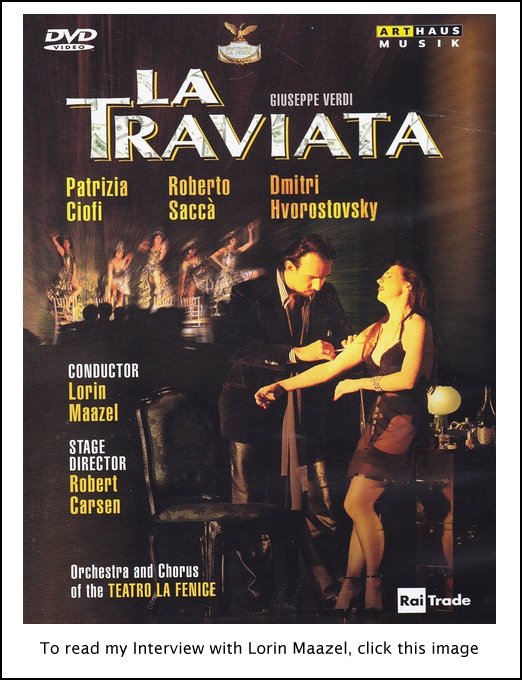 DH: Yes, because usually you are meeting different directors with different kinds of reading on the subject. So it’s fine, but I would like to do more operas and more different roles. The time has come already, so I’m learning a lot of new stuff. Next season I will be doing quite a lot of new parts, and I’m really looking forward to this.
DH: Yes, because usually you are meeting different directors with different kinds of reading on the subject. So it’s fine, but I would like to do more operas and more different roles. The time has come already, so I’m learning a lot of new stuff. Next season I will be doing quite a lot of new parts, and I’m really looking forward to this.
BD: Good. The one you’re doing here in Chicago is Germont. Do you like playing such an elderly man when you are such a young man yourself?
DH: It’s interesting because you can improve your acting, not only imagining yourself older but trying to be yourself older, and even trying to think like an old man. I’ve never had that experience of helping my son. I don’t have any son; I have a daughter who is much younger, but to communicate with such a great like actress like June Anderson is just remarkable. I’m feeling that I’m growing up just by working with her. I also enjoy singing with Giuseppe Sabbatini. We were already nice friends because it’s not the first time we are working together, and we’re going to have our next opera together, Onegin at Covent Garden in London. We’re going to fly from Chicago to London together, so we are really working as a team. And, of course, it’s a gorgeous music. [The Onegin also featured Catherine Malfitanoand Gwynne Howell, conducted by Mark Ermler.]
BD: It’ll be interesting to change from a father-son relationship to a friend-and-friend relationship.
DH: Friend-and-friend, but I’m still older! [Both laugh]
BD: The baritone is always the older man.
DH: Yes, it’s our destiny. [With humor] What can we do?
BD: Would you rather get the girl?
DH: Well, if you take Don Giovanni, he takes the girls sometimes, but he’s still unhappy.
BD: But when we meet Don Giovanni, he really is at the end of his conquests.
DH: That’s right, yes, but he endures, trying to get someone.
BD: Have you also sung the Count in The Marriage of Figaro?
DH: No, I haven’t sung it yet. I’m loving this stuff now, and I’m going to sing him later.
BD: Again, the older man.
DH: Yes. Obviously he can be happy in the opera, so we will have to deal with this.
BD: Do you enjoy roles that require flexibility in the voice?
DH: Yes, very much. Thank God I can still sing some coloratura stuff. I used to do a lot of Italian Arie Antiche, including sometimes quite crazy coloratura. You can find some different cadenzas because most of them are da capo, so you can sing anything you want, but it very much depends on your taste. If you pick up the oldest scores which describe coloraturas from the end of eighteenth or beginning of the nineteenth century, you can sing that stuff, which is quite enough for our generation because the real ‘bel canto’ singers have gone. But you can try, and I do enjoy this very much, and my voice responds to this. Of course, if you still doing the trills, that means you still have your voice in a fresh condition. It’s a very, very good school, and a very healthful thing for your voice. However, I’m more curious for more dramatic stuff because I’m far too wild to just do delicate things like Arie Antiche. Personally I would love to do more dramatic parts, but again I have to wait.
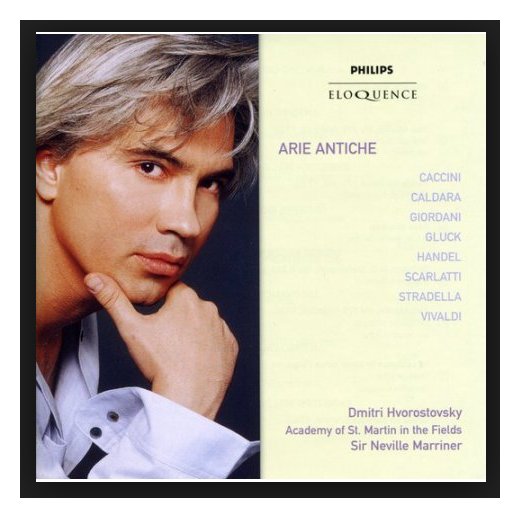 BD: Do you adjust your vocal technique for the size of the house —from a big house to a small house?
BD: Do you adjust your vocal technique for the size of the house —from a big house to a small house?
DH: This house here in Chicago is quite big, but the acoustic is enormous. It’s very good acoustic. Actually I’ve never seen such a combination with a great and gorgeous-looking theater, and a gorgeous acoustic. It’s quite remarkable. It’s quite unique because in comparison, for instance, in Covent Garden and La Scala, these houses are much drier, and sometimes you find yourself screaming, which is very dangerous. If you scream, it never will help you enough. That’s the secret of singing, but it provokes you, and you have to be very careful not to scream. There is a theater in Barcelona which is almost the same size... well, probably a bit smaller, and it has a very natural and good acoustic. I should go and see some more opera houses, but this one is first for me. I’m really very nicely surprised.
BD: Now you say you should be doing this, or you should be doing more of this. Do you make sure that you pace your career so you don’t sing too much, too often, too heavy?
DH: That’s very easy to check, actually. I have it all written in my diary for four years ahead, so you can count it, and if I don’t need something, I can simply throw it away and say,
“I’m sorry, I can’t do this, I can’t do this, I have to rest here, or I need some time to learn things.”So I hope I’m doing well, but it’s quite busy, and I have to work quite hard. But it’s only the fourth year of my career, and I understand I have to work very hard to be more relaxed later on. [Laughs]
BD: Are you at the point now where you want to be in your career?
DH: Kind of, yes. I’m very practical, very cool, and I understand what I’m doing. So I think I’m in a right way, and I’m doing quite nicely, quite fine. I used to get my goals. I used to get what I wanted sooner or later, and I think I’m doing well.
BD: Is singing fun?
DH: Yes!
BD: Good. Are you coming back to Chicago?
DH: Yes, I will. It’s booked! Even if I wouldn’t be booked, I will come back because of how nice this town is. It is a pleasure to work in such a great opera, with a great company. Really I am very pleased.
BD: Thank you for coming, and I look forward to more of your performances.
DH: Thank you.
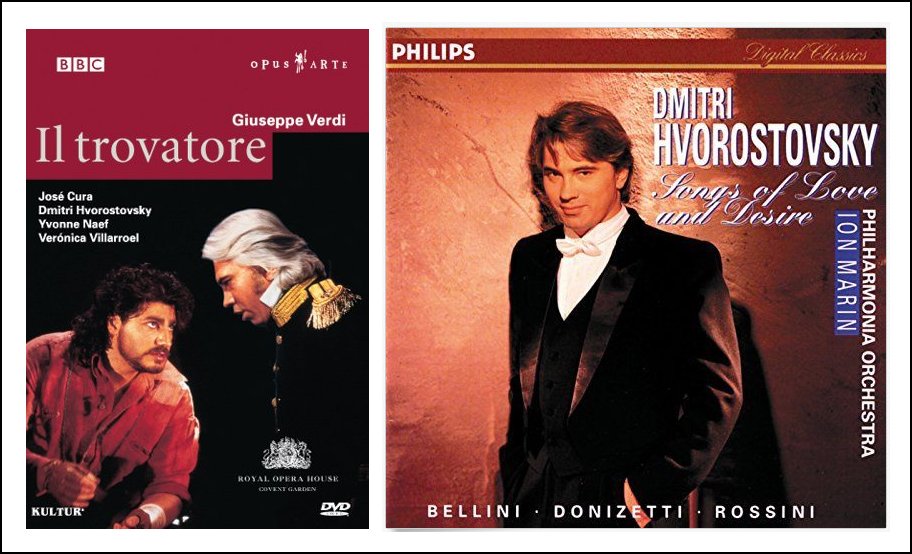
© 1993 Bruce Duffie
This conversation was recorded in Chicago on September 23, 1993. Portions were broadcast on WNIB two weeks later, and again the following year, as well as in 1997 and 1998. This transcription was made in 2017, and posted on this website at that time. My thanks to British soprano Una Barry for her help in preparing this website presentation.
To see a full list (with links) of interviews which have been transcribed and posted on this website, click here.
Award - winning broadcaster Bruce Duffie was with WNIB, Classical 97 in Chicago from 1975 until its final moment as a classical station in February of 2001. His interviews have also appeared in various magazines and journals since 1980, and he now continues his broadcast series on WNUR-FM, as well as on Contemporary Classical Internet Radio.
You are invited to visit his website for more information about his work, including selected transcripts of other interviews, plus a full list of his guests. He would also like to call your attention to the photos and information abouthis grandfather, who was a pioneer in the automotive field more than a century ago. You may also send him E-Mail with comments, questions and suggestions.
